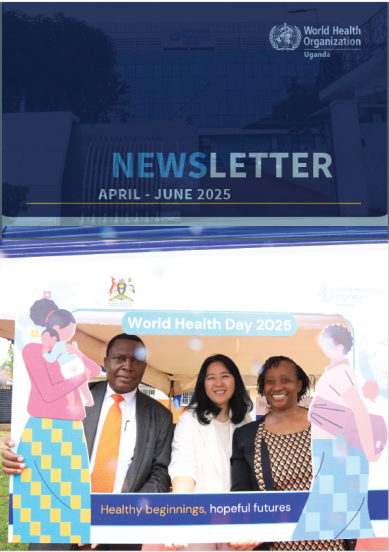
WHO UGANDA Q2 (April-June 2025) Newsletter
The second quarter of 2025 has been marked by resilience, innovation, and a renewed commitment to health for all. Uganda’s declaration of the end of the Ebola outbreak in April stands as a powerful testament to what is possible when preparedness, rapid response, and community trust come together. The courageous journeys of survivors like Dr. Ezra Mupakasa and Aisha Nangobi remind us that healing goes beyond clinical care—it demands compassion, reintegration, and sustained support.
This period also saw the commemoration of World Health Day, offering a moment to reflect on progress made and the road ahead in achieving health equity. It served as a timely reminder that health is a fundamental human right, and that our collective efforts must continue to prioritize the most vulnerable.
Among the most tangible examples of impact is the transformation of Mayuge Health Center III, supported through the KOICA-funded Health System Strengthening Project. The story of Ajambo Juliet, who now walks eight kilometers to access dignified, quality care, illustrates the life-changing power of strategic investment and strong partnerships in health infrastructure.
In the fight against malaria, the launch of the “24.2 Hours Initiative” represents a bold step forward. By ensuring timely treatment—within 24 hours for uncomplicated cases and 2 hours for severe ones—this strategy, backed by WHO and partners, is already reshaping how communities access care and how health systems respond to one of Uganda’s most persistent health threats.
Uganda is also leading the way in phasing out mercury-containing medical devices. Through a collaborative effort supported by WHO, the United Nations Environment Programme (UNEP), and national agencies, the country is transitioning to safer, mercury-free healthcare—protecting both people and the environment, and setting a regional benchmark for sustainable innovation.
None of these achievements would be possible without the enduring partnerships that continue to drive Uganda’s health agenda forward. From global institutions to local communities, the collective effort behind every campaign, review, and reform is a testament to what we can accomplish together.
Finally, we celebrate the individuals who embody the spirit of service. Patrick Wokorach’s 20-year journey with WHO, which began in the midst of conflict, and Joan Kaitesi’s trailblazing path as a female driver in a male-dominated field, are powerful reminders that behind every success are people whose dedication, courage, and quiet leadership make all the difference.


